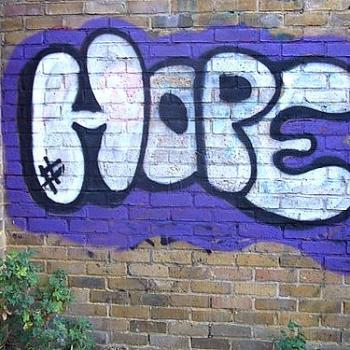When I was little, my mom gave me one of those WWJD bracelets – you know the ones, ‘90s Christian kitsch, little wooden cubes beaded together. WWJD: What Would Jesus Do? It was more an identity statement than a serious ethical challenge. But the idea that I could actually choose to be Christlike (or not) in my engagements with the world rocked my eight year old brain.
It was a disquieting pause before trading a Pokemon card I knew deep down wasn’t in my trading partner’s best interest. Or a nagging in my heart telling me to stick up for my friend when teasing turned to bullying. Often, I could ignore that small voice. But childhood moral dilemmas aside, there was real value in wearing a physical reminder that God expects something of us. Those expectations aren’t found in ritual displays of piety or reciting certain key phrases. They’re in our ordinary behavior over the course of life. It’s the idea that living itself is a testament to the values that animate us. The way we live is a form of worship.
I don’t have that bracelet anymore, but I still think about those expectations. We often reach for lazy metaphors when we consider them. We think of God as a king or a micromanaging boss. Do this, don’t do that, and sure, love your neighbor – but with “neighbor” quite narrowly defined. We miss the profundity of who and what God is, which can’t help but limit our understanding of how to live in right relationship with the divine.
God as Gardener
Our ancestors in faith who wrote the various books of the Bible understood God is no mere earthly ruler. While God is sometimes described in those terms, we also find descriptions of God existing as a force above, beneath, and inside the totality of Creation. “God is love” may be cliche, but that doesn’t make it any less true. God is the one in whom we “live and move and have our being.” Considering the incomprehensible scale of our divine Creator makes it easier to see beyond the damaging God-as-human-leader mindset that excludes and marginalizes.
With this in mind we can begin to mark out a path to right relationship, and it’s a simple one. So simple, in fact, that it fits in abbreviated form on a little bracelet. But simple doesn’t mean easy. Choosing to live in a Christlike way involves changing our priorities. Writing before the Incarnation, the prophet Micah channels the divine voice when he tells us what the Lord requires: “to seek justice, love mercy, and walk humbly with your God.” (Micah 6:8) To make sure we get it, Jesus summarizes the Law and the Prophets with the Greatest Commandment. We are instructed to love the Lord with all our hearts & strength, and to love our neighbors as ourselves.
Remembering that the entire human family constitutes our neighborhood, the Greatest Commandment has far-reaching implications in every sphere of life. In one seriously underutilized divinity metaphor we find in the Bible, Isaiah likens God leading the people of Israel back from exile to a gardener tending his plot:
“the LORD will guide you always; he will satisfy your needs in a sun-scorched land and will strengthen your frame. You will be like a well-watered garden, like a spring whose waters never fail.” (Isaiah 58:11)
Faith as Practice
We have not been doing a very good job as stewards of God’s garden. We prop up, either actively or through acquiescence, systems of sin that alienate us from ourselves, each other, and the natural world given to us.
The good news is that it’s not too late. It never will be. We may be unfaithful idol builders – be they wealth, prestige, doctrinal purity or whatever else – to exalt instead of the living God. But thankfully God’s faithfulness never fails, no matter how many times we screw it up on our end. The grace granted to each one of us empowers us daily to re-center our lives in the godly values of love, justice, and mercy. Again and again, we are called to repentance. There’s a lot of inertia pulling us in the opposite direction, and we will all stumble at times because we are sinful people who live in a sinful world.
We may find a physical reminder helpful in turning our hearts away from the selfishness, cruelty and tribalism we’re immersed in and toward God’s redeeming love. I think it’s time we bring those WWJD bracelets back.












